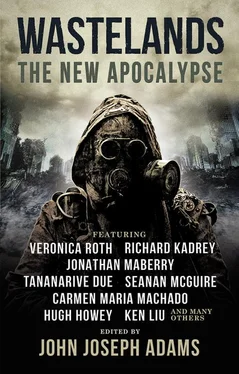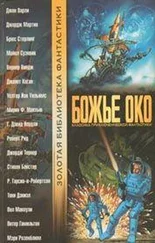Grief.
“You goddamn piece of junk,” she said, not meaning it.
Without the Surrogate, there was only Casey’s voice left in the world.
A tablet device lay on the tandem seat. Words displayed on the screen, instructions on transmitting a number sequence. Casey picked up the tablet, which was the key to unlocking the shield. She climbed into her seat, buckled her restraints, and waited for anger to muscle aside the grief of loneliness; then she spun up the engines, lifted away, and swung towards home base.
The first attack came almost immediately. Projectiles streaked up from the desert. Casey rolled left, rolled right, then plunged for the desert scrub, leveling out at fifty feet. A warning light flashed. Out of the clouds, a glittering swarm came at her.
Casey punched the throttle. The electric power plants whined like things about to burst apart. A burning odor filled the cockpit. The Surrogate rattled and bounced on the cable, the ship violently sucking the last kilowatt from its chest. The base lay dead ahead. So did the shield.
Heat rays crossed her flight path. Casey banked onto her wing tip and veered between them, flying with the skill of unconscious desperation, proving she did want to live. The maneuver drew the attack swarm into the rays. Fireballs burst like red kernels all around her. Casey tapped in the key code and transmitted it to the shield. She squeezed shut her eyes as the VTOL streaked over the border, the force shield rising automatically behind her. Rays, projectiles, and swarms burst spectacularly against it.
On the ground, Casey threw open the canopy. Sweating profusely inside her flight suit, she reached over the seat to unbuckle the robot, but the straps had melted into its frame. She used her knife to cut them away. The Surrogate’s metal body remained searingly hot. Casey ran to the nearest intact hangar and returned with a chain-fall and a rolling cart. She pulled on big silver oven-mitt-looking asbestos gloves and used the chain-fall to hoist the Surrogate out of the cockpit and lower it onto the cart.
* * *
Restoring the Surrogate’s mobility proved impossible. Casey had left the turkey bone parts behind, and she wasn’t a mechanic, anyway. Replenishing the robot’s power seemed at least worth a try. Casey rolled the Surrogate to the fusion generator building, which powered the force shield and everything else on the base. She rigged a connection between the generator and the Surrogate, and then she waited. After three days the Surrogate showed no signs of life, or whatever it was that animated the AI. After a week she stopped checking on it.
Without the Surrogate’s voice, the base became a tomb in which Casey wept and talked to herself and then stopped talking. She wandered the streets she had always wandered, while inside she unraveled in loneliness. Some nights she stood at the perimeter, almost wishing the weapons assault would resume—and this time be successful. She toyed with the idea of lowering the shield, but she was past that.
At night, stars encrusted the New Mexico sky, a bed of diamonds to hold the yellow rind of the moon. Suddenly Casey’s attention quickened. A point of light sped silently across the sky. She sat forward, making the chair creak. But it was only a weather sat, remnant of the conquered human race, not a humanitarian mission from Luna. She stood up and walked through the broken door into her house.
* * *
After a month’s absence, she returned to the generator building. It had taken that long to believe again in the possibility of hope. She dragged her feet the whole way, indulged detours, pretended she wasn’t hoping, and finally approached the door. Something rapped against it from the other side. Casey stopped—then ran the rest of the way. When she wrenched open the door, the legless Surrogate lay on the floor, one arm raised.
“You were gone a long time, Casey Stillman,” it said. “I was worried.”
She swallowed. “I’m here now.”
* * *
Casey took the Surrogate with her when she went to the warehouse for supplies. MREs lasted forever and there were enough of them to feed a thousand soldiers for a year. She placed the Surrogate’s torso and paint-can head on the cart and pulled it behind her, the way Casey’s mother had pulled her in the red wagon. The sound of the wheels was like a memory echoing up a long tunnel. Casey looked over her shoulder. The Surrogate’s blue eyes watched her.
“They’re really coming, aren’t they,” Casey said. “The Moonites.”
“Yes,” the head in the wagon replied.
The Surrogate was always right.
THROUGH SPARKS IN MORNING’S DAWN
TOBIAS S. BUCKELL
Tobias S. Buckell, who has been called “violent, poetic and compulsively readable” by Maclean’s , is a science fiction author and New York Times bestselling writer born in the Caribbean. He grew up in Grenada and spent time in the British and US Virgin Islands, and the islands he lived on influence much of his work. His popular Xenowealth series begins with Crystal Rain . Along with other stand-alone novels and his over seventy stories, his works have been translated into eighteen different languages, and selected for inclusion in Best American Science Fiction and Fantasy . He has been nominated for awards like the Hugo, Nebula, Prometheus, and the John W. Campbell Award for Best New Science Fiction Author. His latest novel is The Tangled Lands written with Paolo Bacigalupi, which the Washington Post said is “a rich and haunting novel that explores a world where magic is forbidden.” He currently lives in Bluffton, Ohio with his wife, twin daughters, and a pair of dogs. He can be found online at TobiasBuckell.com.
A raider on a horse burst out of the scrubby bush along the road, and Mara swung hard on the tiller to jam the rear wheel of her sail cart to the side. The cart was an open cabin for two on a low-slung aluminum tricycle chassis, and Mara winced as the old fiberglass pod snapped and creaked; it was too old for strain like this. She shoved Gillem down without even thinking as the boom swung over their heads. The brake-boy’s eyes went wide at the near miss. The cart’s sail cracked as the wind filled it once more.
The horse was fast . Mara flicked the contact switch on the tiller to on and pushed a pedal. The tiny rubber wheels just under their legs skidded as the hub motors kicked in for a boost and shoved the sail cart forward down the old county road.
Gillem’s eyes were wide open and white with fear. Sweat trickled off his dirty, shaved scalp. His eyes were huge behind oversized, thick eyeglasses strapped to his face with a dirty rubber strap.
“Hold the wheel!” Mara ordered.
He did, his black grease-stained hands gripping the hand-carved pine as he awkwardly stumbled back toward her. The cart’s springs shifted and squeaked, the whole oblong body of the cart nearly tipping both of them out onto ancient asphalt.
Gillem was a brake-boy on the Zephyr and little more than a bag of bones, as boys his age usually were these days. He spent most of his time sitting in an axle cubby, waiting to push hard at a contact plate. He wasn’t used to riding out in the open on a tiny cart, tipping over when the wind gusted. The Zephyr was three hundred feet long, trundling with ease over the great potholes that in the little sail cart Mara had to swerve to dodge lest they get swallowed up by crumbling asphalt.
“Eyes forward!” Mara hissed at the boy. The last thing they needed to do was eat road right now.
She raised the long barrel of her rifle and tried to sight down it at the man on the horse. He wore a tattered pre-collapse US Army kevlar vest, painted black. There were ram horns on his helmet, dipped in some fluorescent yellow substance, and he bellowed rage at her. Mara held her breath, as she’d been taught, and began to tighten her grip on her weapon.
Читать дальше


![Nick Cracknell - The Quiet Apocalypse [= Island Zero]](/books/28041/nick-cracknell-the-quiet-apocalypse-island-zero-thumb.webp)









